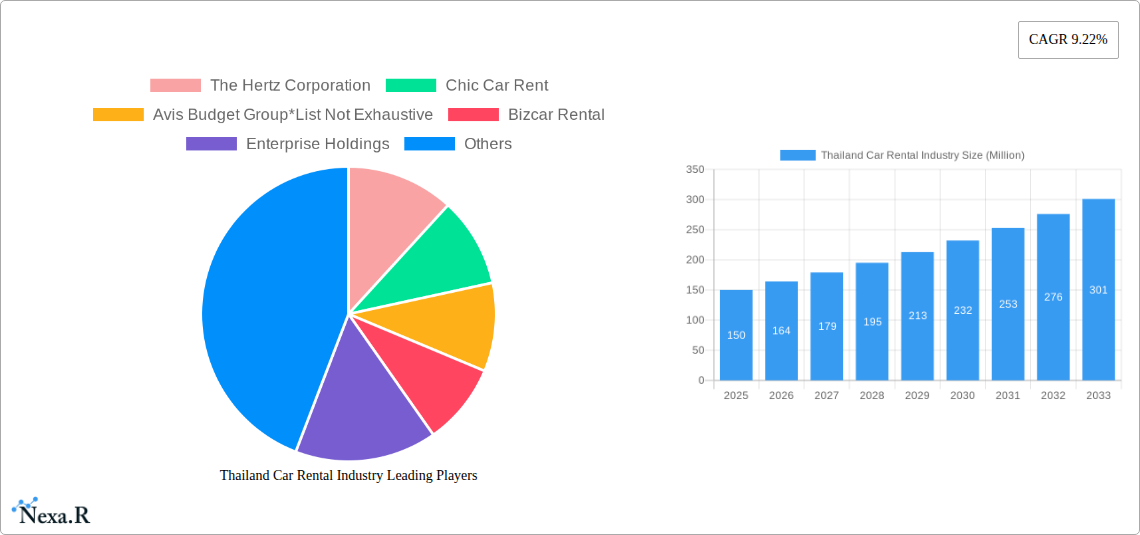Key Insights
The Thailand car rental market is projected for significant expansion, with an estimated Compound Annual Growth Rate (CAGR) of 9.95%. The market, valued at approximately $1.18 billion in the base year of 2025, is expected to witness substantial growth by 2033. This upward trajectory is primarily driven by Thailand's robust tourism industry, which attracts a vast number of domestic and international visitors, thereby fueling demand for short-term rentals. Concurrently, increasing urbanization and infrastructure development are boosting the long-term rental segment, serving both corporate and individual needs. The widespread adoption of online booking platforms further enhances convenience and accessibility, simplifying the rental process. Key challenges include the impact of fluctuating fuel prices and economic downturns on rental demand, alongside competition from ride-hailing services and public transportation options. Market segmentation highlights a strong preference for online bookings, presenting a considerable opportunity for digital platform investment and enhancement. While the short-term rental segment currently leads, driven by tourism, the long-term segment is anticipated to grow more rapidly due to economic expansion and increasing limitations on individual car ownership in urban centers.

Thailand Car Rental Industry Market Size (In Billion)

The competitive environment features prominent international brands such as Hertz, Avis Budget Group, and Europcar, alongside domestic operators like Chic Car Rent and Thai Rent A Car. These companies are actively engaged in enhancing service offerings, expanding fleet capacities, and leveraging technological advancements to secure a competitive advantage. Future growth will likely depend on strategic alliances, fleet modernization, and innovative pricing strategies to meet evolving customer preferences. Key strategic priorities include expanding into under-served geographical areas, improving customer service standards, and implementing sustainable operational practices to address environmental considerations. A comprehensive understanding of these market dynamics is crucial for both established and emerging participants in Thailand's dynamic car rental sector. Analyzing diverse market segments, from online to offline booking channels and short-term versus long-term rental preferences, will be instrumental for informed strategic planning and identifying viable investment opportunities.

Thailand Car Rental Industry Company Market Share

Thailand Car Rental Industry: 2019-2033 Market Report
This comprehensive report provides an in-depth analysis of the Thailand car rental market, covering its dynamics, growth trends, dominant segments, competitive landscape, and future outlook. The study period spans from 2019 to 2033, with a focus on the 2025 estimated year and a forecast period of 2025-2033. This report is essential for industry professionals, investors, and strategic decision-makers seeking to understand and capitalize on the opportunities within this dynamic market. The report uses Million units as the currency for all values.
Thailand Car Rental Industry Market Dynamics & Structure
This section analyzes the competitive landscape, technological advancements, regulatory environment, and market trends within the Thailand car rental industry. The market is characterized by a mix of international players like The Hertz Corporation, Avis Budget Group, and Europcar Mobility Group, alongside local companies such as Thai Rent A Car and Chic Car Rent. The market concentration is moderate, with several key players vying for market share.
- Market Concentration: xx% (Top 5 players).
- Technological Innovation: Focus on electric vehicle (EV) adoption, online booking platforms, and mobile applications. Innovation barriers include infrastructure limitations for EVs and digital literacy among some segments.
- Regulatory Framework: Government regulations concerning licensing, insurance, and vehicle standards significantly influence market operations.
- Competitive Substitutes: Public transportation, ride-hailing services (Grab, Bolt), and personal vehicle ownership pose competitive pressure.
- End-User Demographics: The market caters primarily to tourists, business travelers, and local commuters, with varying rental durations and preferences.
- M&A Trends: xx M&A deals occurred between 2019-2024, indicating moderate consolidation. Future M&A activity is anticipated to increase driven by market expansion and technological integration.
Thailand Car Rental Industry Growth Trends & Insights
The Thailand car rental market experienced significant growth from 2019-2024, driven by increasing tourism, rising disposable incomes, and improved infrastructure. The market size in 2024 reached xx Million units, exhibiting a CAGR of xx% during the historical period. The adoption of online booking platforms has significantly accelerated, enhancing convenience and transparency for consumers. Technological disruptions, particularly the introduction of EVs, are reshaping the industry. Consumer behavior is shifting toward short-term rentals for tourism and longer-term rentals for business or relocation needs. The projected market size for 2025 is xx Million units, with a forecasted CAGR of xx% from 2025 to 2033. Market penetration for online bookings is expected to reach xx% by 2033.
Dominant Regions, Countries, or Segments in Thailand Car Rental Industry
Bangkok remains the dominant region, followed by Phuket and other major tourist destinations. The short-term rental segment, primarily driven by tourism, dominates the market with a significant market share of xx%. Online bookings are increasingly popular, surpassing offline methods in terms of growth rate, currently accounting for approximately xx% of the market.
- Key Drivers for Bangkok's Dominance: High tourist footfall, extensive business travel, and better infrastructure.
- Key Drivers for Short-Term Rentals: Tourism boom, ease of access, and flexible booking options.
- Key Drivers for Online Bookings: Convenience, price comparison, and wider availability.
- Growth Potential: Expansion into secondary cities and increasing long-term rental demand for expatriates and business relocations.
Thailand Car Rental Industry Product Landscape
The car rental industry offers a range of vehicles, from economy cars to luxury SUVs, catering to diverse customer needs. Innovations include the introduction of electric vehicles (EVs) and the adoption of advanced technology, such as GPS tracking and mobile applications for seamless booking and management. Unique selling propositions focus on customer service, convenience, and fleet diversity. Technological advancements improve operational efficiency, reduce costs, and enhance the customer experience.
Key Drivers, Barriers & Challenges in Thailand Car Rental Industry
Key Drivers:
- Growing tourism and business travel.
- Increasing disposable incomes among the population.
- Government investment in infrastructure development.
- Expansion of online booking platforms.
- Rising demand for electric vehicles.
Key Challenges:
- Intense competition from established and new players.
- Regulatory hurdles and licensing requirements.
- Fluctuations in fuel prices and currency exchange rates.
- Limited charging infrastructure for electric vehicles (xx% EV charging station coverage).
- Seasonality impacting demand, particularly within the tourism sector.
Emerging Opportunities in Thailand Car Rental Industry
- Expansion into less-developed regions with growing tourism.
- Offering specialized services such as chauffeur-driven cars or campervans.
- Targeting niche markets, such as eco-tourism and adventure travel.
- Leveraging technology for personalized recommendations and customized rental packages.
- Partnerships with hotels and tour operators for bundled services.
Growth Accelerators in the Thailand Car Rental Industry
Technological advancements in vehicle telematics and data analytics will optimize fleet management and improve customer service. Strategic partnerships with hotels, airlines, and tourism agencies will expand market reach. Aggressive expansion into secondary cities and investment in EV infrastructure will cater to the evolving needs of a growing market.
Key Players Shaping the Thailand Car Rental Industry Market
- The Hertz Corporation
- Chic Car Rent
- Avis Budget Group
- Bizcar Rental
- Enterprise Holdings
- Thai Rent A Car
- Europcar Mobility Group
Notable Milestones in Thailand Car Rental Industry Sector
- July 2022: InterContinental Phuket Resort and SIXT Thailand partnered to introduce Nissan Leaf EVs, installing six EV charging points.
- April 2022: Sixt launched "SIXT ELECTRIC" service with 100 EVs (Nissan Leaf and ORA Good Cat), planning expansion to Bangkok and other major cities.
- March 2022: Thrifty Car Rental (Hertz subsidiary) began operations in Thailand, partnering with Paragon Car Rental in Bangkok and Pattaya.
In-Depth Thailand Car Rental Industry Market Outlook
The Thailand car rental industry is poised for sustained growth, driven by rising tourism, infrastructure improvements, and technological innovations. The increasing adoption of online booking platforms and the expansion of EV infrastructure will shape future market dynamics. Strategic partnerships and targeted market expansion into secondary cities will further propel growth and create significant opportunities for players in this dynamic market. The projected market size in 2033 is estimated to reach xx Million units.
Thailand Car Rental Industry Segmentation
-
1. Booking Type
- 1.1. Online
- 1.2. Offline
-
2. Rental Duration
- 2.1. Short-term
- 2.2. Long-term
-
3. Application Type
- 3.1. Tourism
- 3.2. Commuting
Thailand Car Rental Industry Segmentation By Geography
- 1. Thailand

Thailand Car Rental Industry Regional Market Share

Geographic Coverage of Thailand Car Rental Industry
Thailand Car Rental Industry REPORT HIGHLIGHTS
| Aspects | Details |
|---|---|
| Study Period | 2020-2034 |
| Base Year | 2025 |
| Estimated Year | 2026 |
| Forecast Period | 2026-2034 |
| Historical Period | 2020-2025 |
| Growth Rate | CAGR of 9.95% from 2020-2034 |
| Segmentation |
|
Table of Contents
- 1. Introduction
- 1.1. Research Scope
- 1.2. Market Segmentation
- 1.3. Research Methodology
- 1.4. Definitions and Assumptions
- 2. Executive Summary
- 2.1. Introduction
- 3. Market Dynamics
- 3.1. Introduction
- 3.2. Market Drivers
- 3.2.1. Rise in Tourism Activities to Positively Drive the Market
- 3.3. Market Restrains
- 3.3.1. Hike in Fuel Price May Challenge the Market Growth
- 3.4. Market Trends
- 3.4.1. Rising Tourism Industry in the Region Drives the Market
- 4. Market Factor Analysis
- 4.1. Porters Five Forces
- 4.2. Supply/Value Chain
- 4.3. PESTEL analysis
- 4.4. Market Entropy
- 4.5. Patent/Trademark Analysis
- 5. Thailand Car Rental Industry Analysis, Insights and Forecast, 2020-2032
- 5.1. Market Analysis, Insights and Forecast - by Booking Type
- 5.1.1. Online
- 5.1.2. Offline
- 5.2. Market Analysis, Insights and Forecast - by Rental Duration
- 5.2.1. Short-term
- 5.2.2. Long-term
- 5.3. Market Analysis, Insights and Forecast - by Application Type
- 5.3.1. Tourism
- 5.3.2. Commuting
- 5.4. Market Analysis, Insights and Forecast - by Region
- 5.4.1. Thailand
- 5.1. Market Analysis, Insights and Forecast - by Booking Type
- 6. Competitive Analysis
- 6.1. Market Share Analysis 2025
- 6.2. Company Profiles
- 6.2.1 The Hertz Corporation
- 6.2.1.1. Overview
- 6.2.1.2. Products
- 6.2.1.3. SWOT Analysis
- 6.2.1.4. Recent Developments
- 6.2.1.5. Financials (Based on Availability)
- 6.2.2 Chic Car Rent
- 6.2.2.1. Overview
- 6.2.2.2. Products
- 6.2.2.3. SWOT Analysis
- 6.2.2.4. Recent Developments
- 6.2.2.5. Financials (Based on Availability)
- 6.2.3 Avis Budget Group*List Not Exhaustive
- 6.2.3.1. Overview
- 6.2.3.2. Products
- 6.2.3.3. SWOT Analysis
- 6.2.3.4. Recent Developments
- 6.2.3.5. Financials (Based on Availability)
- 6.2.4 Bizcar Rental
- 6.2.4.1. Overview
- 6.2.4.2. Products
- 6.2.4.3. SWOT Analysis
- 6.2.4.4. Recent Developments
- 6.2.4.5. Financials (Based on Availability)
- 6.2.5 Enterprise Holdings
- 6.2.5.1. Overview
- 6.2.5.2. Products
- 6.2.5.3. SWOT Analysis
- 6.2.5.4. Recent Developments
- 6.2.5.5. Financials (Based on Availability)
- 6.2.6 Thai Rent A Car
- 6.2.6.1. Overview
- 6.2.6.2. Products
- 6.2.6.3. SWOT Analysis
- 6.2.6.4. Recent Developments
- 6.2.6.5. Financials (Based on Availability)
- 6.2.7 Europcar Mobility Group
- 6.2.7.1. Overview
- 6.2.7.2. Products
- 6.2.7.3. SWOT Analysis
- 6.2.7.4. Recent Developments
- 6.2.7.5. Financials (Based on Availability)
- 6.2.1 The Hertz Corporation
List of Figures
- Figure 1: Thailand Car Rental Industry Revenue Breakdown (billion, %) by Product 2025 & 2033
- Figure 2: Thailand Car Rental Industry Share (%) by Company 2025
List of Tables
- Table 1: Thailand Car Rental Industry Revenue billion Forecast, by Booking Type 2020 & 2033
- Table 2: Thailand Car Rental Industry Revenue billion Forecast, by Rental Duration 2020 & 2033
- Table 3: Thailand Car Rental Industry Revenue billion Forecast, by Application Type 2020 & 2033
- Table 4: Thailand Car Rental Industry Revenue billion Forecast, by Region 2020 & 2033
- Table 5: Thailand Car Rental Industry Revenue billion Forecast, by Booking Type 2020 & 2033
- Table 6: Thailand Car Rental Industry Revenue billion Forecast, by Rental Duration 2020 & 2033
- Table 7: Thailand Car Rental Industry Revenue billion Forecast, by Application Type 2020 & 2033
- Table 8: Thailand Car Rental Industry Revenue billion Forecast, by Country 2020 & 2033
Frequently Asked Questions
1. What is the projected Compound Annual Growth Rate (CAGR) of the Thailand Car Rental Industry?
The projected CAGR is approximately 9.95%.
2. Which companies are prominent players in the Thailand Car Rental Industry?
Key companies in the market include The Hertz Corporation, Chic Car Rent, Avis Budget Group*List Not Exhaustive, Bizcar Rental, Enterprise Holdings, Thai Rent A Car, Europcar Mobility Group.
3. What are the main segments of the Thailand Car Rental Industry?
The market segments include Booking Type, Rental Duration, Application Type.
4. Can you provide details about the market size?
The market size is estimated to be USD 1.18 billion as of 2022.
5. What are some drivers contributing to market growth?
Rise in Tourism Activities to Positively Drive the Market.
6. What are the notable trends driving market growth?
Rising Tourism Industry in the Region Drives the Market.
7. Are there any restraints impacting market growth?
Hike in Fuel Price May Challenge the Market Growth.
8. Can you provide examples of recent developments in the market?
In July 2022, InterContinental Phuket Resort and SIXT Thailand formed a partnership that will introduce the Nissan Leaf to its rental collection in Phuket. To power this new fleet of EVs, InterContinental Phuket Resort has installed a total of six EV charging points - four AC stations and one1 DC station with two chargers.
9. What pricing options are available for accessing the report?
Pricing options include single-user, multi-user, and enterprise licenses priced at USD 3800, USD 4500, and USD 5800 respectively.
10. Is the market size provided in terms of value or volume?
The market size is provided in terms of value, measured in billion.
11. Are there any specific market keywords associated with the report?
Yes, the market keyword associated with the report is "Thailand Car Rental Industry," which aids in identifying and referencing the specific market segment covered.
12. How do I determine which pricing option suits my needs best?
The pricing options vary based on user requirements and access needs. Individual users may opt for single-user licenses, while businesses requiring broader access may choose multi-user or enterprise licenses for cost-effective access to the report.
13. Are there any additional resources or data provided in the Thailand Car Rental Industry report?
While the report offers comprehensive insights, it's advisable to review the specific contents or supplementary materials provided to ascertain if additional resources or data are available.
14. How can I stay updated on further developments or reports in the Thailand Car Rental Industry?
To stay informed about further developments, trends, and reports in the Thailand Car Rental Industry, consider subscribing to industry newsletters, following relevant companies and organizations, or regularly checking reputable industry news sources and publications.
Methodology
Step 1 - Identification of Relevant Samples Size from Population Database



Step 2 - Approaches for Defining Global Market Size (Value, Volume* & Price*)

Note*: In applicable scenarios
Step 3 - Data Sources
Primary Research
- Web Analytics
- Survey Reports
- Research Institute
- Latest Research Reports
- Opinion Leaders
Secondary Research
- Annual Reports
- White Paper
- Latest Press Release
- Industry Association
- Paid Database
- Investor Presentations

Step 4 - Data Triangulation
Involves using different sources of information in order to increase the validity of a study
These sources are likely to be stakeholders in a program - participants, other researchers, program staff, other community members, and so on.
Then we put all data in single framework & apply various statistical tools to find out the dynamic on the market.
During the analysis stage, feedback from the stakeholder groups would be compared to determine areas of agreement as well as areas of divergence


